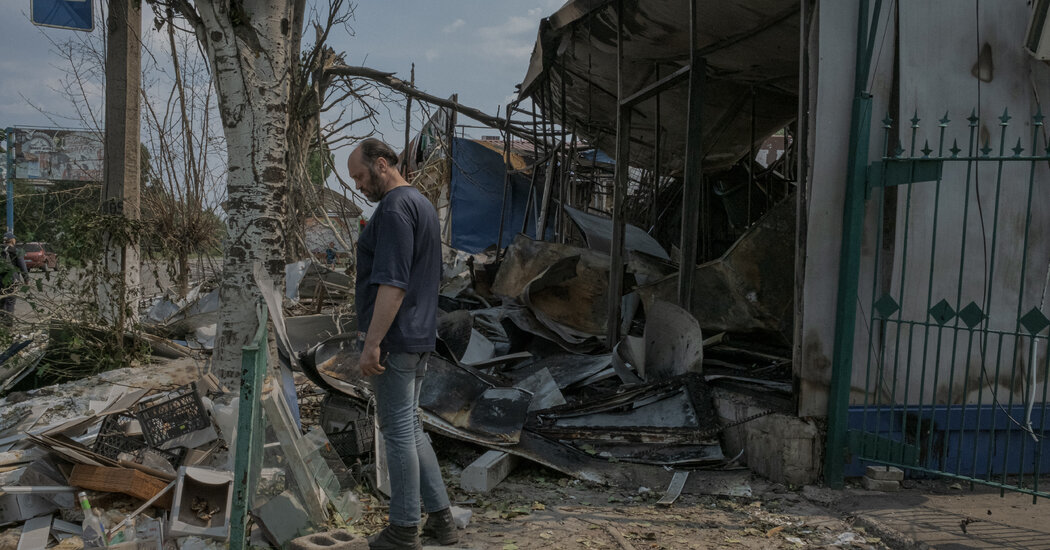
President Vladimir V. Putin of Russia arrived in Iran on Tuesday for a rare international visit, underscoring how the war in Ukraine is helping to align two regional powers isolated from Europe and the United States, and altering the world’s geopolitical calculus.
After landing in Tehran, Mr. Putin sat down with President Ebrahim Raisi of Iran for the third in-person meeting between the two since January. In brief televised comments at the beginning of their talks, Mr. Putin touted the two countries’ relations “developing at a good pace” in economic, security and regional affairs.
“Everything is developing very quickly, including with regard to our bilateral relations,” Mr. Raisi told Mr. Putin, according to a Kremlin transcript of his remarks. “Both sides have the necessary political will to develop relations and bring them to a practical area.”
The war in Ukraine and a deepening confrontation with the West are bringing Russia and Iran closer together. Officials in both countries have said in recent days that sanctions are helping to unite them, solidifying a long-fraught relationship that is now playing an increasingly central role as a counterweight to American-led efforts to push back against Western adversaries.
The high-level meetings in Tehran, the Iranian capital, are expected to continue late into the evening. In addition to seeing Mr. Raisi, Mr. Putin met with Ayatollah Ali Khamenei, Iran’s supreme leader. He was also planning to meet with President Recep Tayyip Erdogan of Turkey, who was also in Tehran on Tuesday and has emerged as an important mediator between Russia and Ukraine. The three presidents will hold a three-way summit to discuss Syria, where Mr. Erdogan is threatening a military offensive.
Mr. Putin’s meeting with Mr. Khamenei, an honor in Iran, hints at the importance both countries attach to deepening their ties. An Iranian news website, Fararou, pledged that “the more aggressive the U.S. gets in confronting Iran, the closer we will get to Russia.” A conservative Russian outlet, Tsargrad, proclaimed that the emerging alliance represented “a new axis of the good.”
According to American officials, Russia is also looking to Iran to fill its shortage of battlefield drones in Ukraine.
Dmitri S. Peskov, the Kremlin’s spokesman, told an Iranian broadcaster ahead of Mr. Putin’s visit that Iran and Russia could soon sign a treaty on strategic cooperation, expanding their collaboration in banking and finance, and moving away from using the dollar to denominate their trade. He evoked the history of 16th-century diplomacy between Russia and Persia to set the scene for what he promised would be a new era of friendship between Tehran and Moscow.
It is only Mr. Putin’s second trip outside Russia since the start of the war, but the third time he is meeting Mr. Raisi this year: the Iranian president traveled to Moscow in January, and to a regional summit in Turkmenistan last month.
In a three-way summit, the presidents of Iran, Russia and Turkey will discuss Syria, where Mr. Erdogan has been threatening a new military incursion into the northeast to flush out Kurdish militiamen whom Turkey considers terrorists. Mr. Erdogan says any military action would be intended to entice refugees from Syria’s civil war to return to their home countries.
Mr. Khamenei set a chilly tone for that summit earlier on Thursday in a separate meeting with Mr. Erdogan, appearing to reject Turkey’s military plans.
“Terrorism must definitely be confronted, but a military attack on Syria will only benefit the terrorists,” said a message on Mr. Khamenei’s Twitter account alongside a photograph of him meeting with the Turkish leader.
There was no immediate response from Turkey.
Hossein Amir-Abdollahian, Iran’s foreign minister, said that in addition to increasing economic ties, Tuesday’s meetings would address security issues and concerns about a shortage of food supplies. Mr. Erdogan has been working to try to overcome a Russian blockade of Ukrainian grain that has been aggravating a global food crisis.
Last week, Russian and Ukrainian negotiators met in Istanbul for talks on the matter, which the United Nations said yielded progress but no resolution.
“Thanks to your mediation, we have moved forward,” Mr. Putin told Mr. Erdogan in televised remarks at the beginning of their meeting. “Not all issues have been resolved yet, but the fact that there is movement is already a good thing.”




